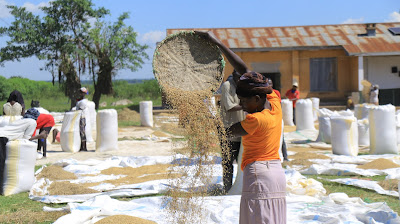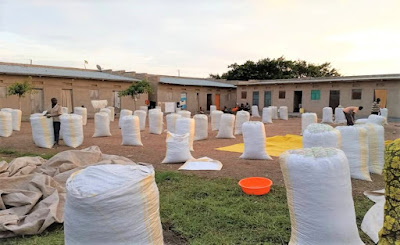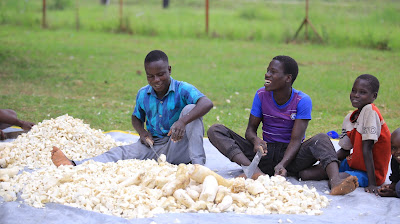The Agriculture Cluster Development e-subsidy program: beneficiary stories
Introduction
The Agricultural Cluster Development Project (ACDP) is implemented by
the Ministry of Agriculture, Animal Industry and Fisheries (MAAIF) with
support from the World Bank. The objective is to raise on-farm productivity, production,
and marketable volumes of five selected priority agricultural commodities (maize,
beans, rice, cassava, and coffee). In
2017, ACDP started with five pilot districts of Ntungumo, Amuru, Kalungu, Nebbi
and Iganga, and by December 2019, mobilization and sensitization had commenced
in 34 roll-out districts.
The
smart e-subsidy program is implemented in three cropping cycles, is time-bound
and declines through the cropping cycles. In season one government grants 67%
subsidy, in season two 50% and in season three 37%. After the third cycle, the
farmer is expected to have graduated both financially and in knowledge to effectively
afford the full cost of the inputs and therefore requires no subsidy. Access to the
inputs is through the e-voucher process.
The e-Voucher
system,
Under the e-Voucher system, a farmer contributes towards the purchase of key inputs needed to intensify the production
of one of the prioritized commodities, on one acre of their farms, and improve
post-harvest handling through investing in farm-level storage. The instrument
for providing a time-bound, partial, and a diminishing matching grant for the
purchase of key farm inputs is the e-Voucher.
Eligible farm households receive an e-Voucher that covers part of the
expense involved in the purchase of a group of inputs (fertilizer, seed, on-farm
storage, access to technical and market information). Each
farm household chooses the specific combination of inputs purchased through the
e-Voucher system from the menu of eligible inputs through ICT tools including
mobile phones). The private sector plays
the role of ensuring that inputs reach the farmers bringing in a key element of
production, quality inputs and establishing input stores in the villages
The main objective
of the e-Voucher system is to manage and track project beneficiaries and
subsidy use. Specifically, the system ensures that a farmer receives input
subsidy support, receives vital and relevant agro
information, and becomes visible to the farm inputs
supply chain, financial systems and to the agricultural extension systems.
Speaking
to Mugume Joram a bean
farmer from Kisenyi Village, Rutembe Sub County, he narrated that, “I expect to harvest 60 tonnes of beans this
season but I still face challenges of market, middle men buy on the farm at very
low prices yet I put in a lot of time and money”. As farmers begin to
realise higher yields, markets are still a challenge. However, the Chief
Administrative Officer, Ntungumo, Ms Nyakito Joanita said, “there is a ready market for beans from
Rwanda, in addition with the good road network buyers came from all over the
country to buy our beans because of the good quality”. This indicates that,
there is need to capitalise on the existing market and create linkages between
the farmers and buyers.
Under the e-subsidy program, the majority of farmers now harvest over
600kgs of beans per acre compared to when they used to harvest 400kgs per acre
before joining the program. For coffee
10kgs per tree is now harvested.
Ssentongo, a coffee farmer from Kigasa village, Kyamulibwa Sub-County in
Kalungu District revealed that he received fertilizers which he applied in his
coffee garden and expects to get approximately 12kgs per tree for this season.
He, however, noted that the e-Voucher system sometimes has network challenges. Farmers can pay in time and but there are delays
in receiving the inputs. One of the reasons he suggested was due to the monopoly
by some suppliers which in turn causes delays in delivery of inputs.
Ssentogo says that in his village, farmers no longer dry coffee on the
ground, but use tarpaulins. This has enabled them to produce clean coffee free
of Aflatoxins. With support from the ACDP Matchmaking grant, they expect to receive over three billion shillings Uganda
shillings that will be used to construct a coffee processing store. Farmers in
the sub-county will also be able to sell collectively, at a good price and job
opportunities will be created for the communities.





Comments
Post a Comment